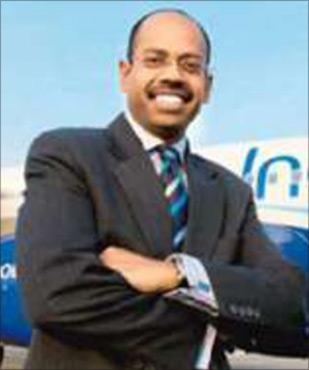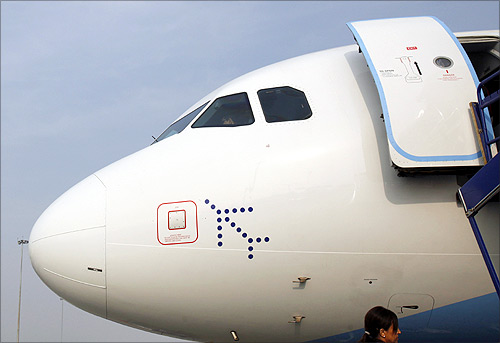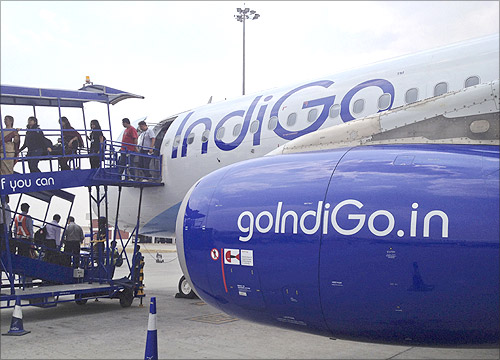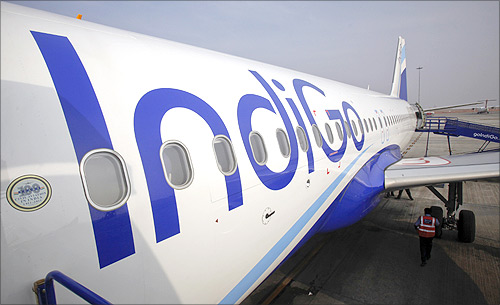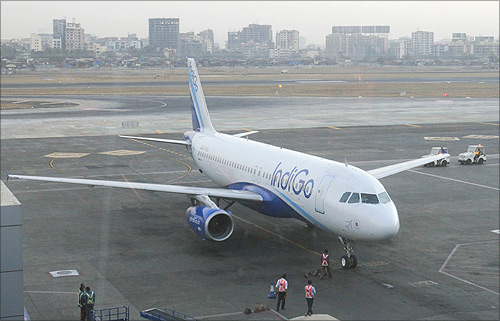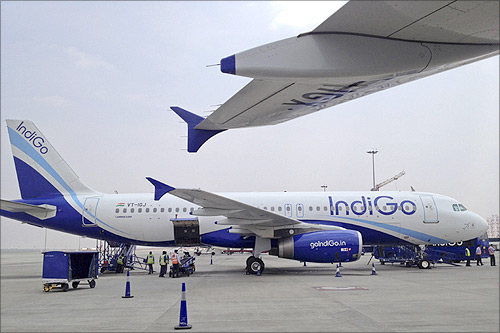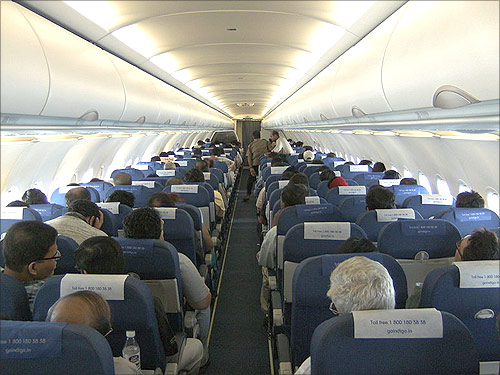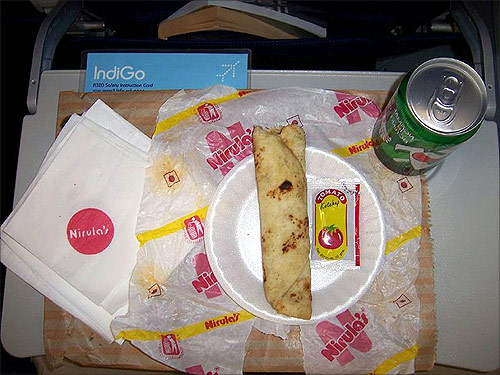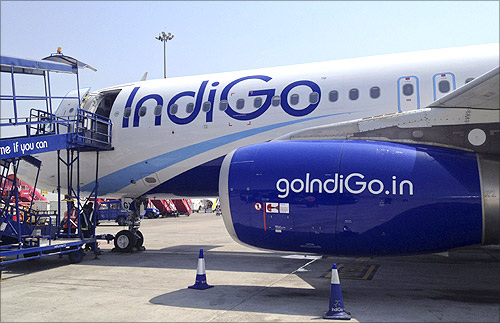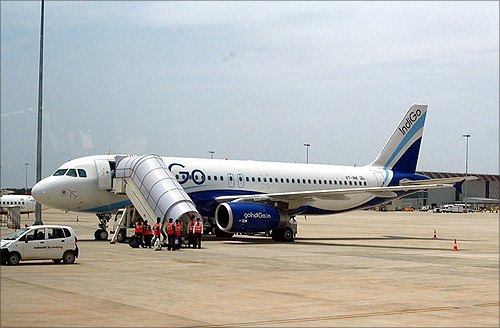 | « Back to article | Print this article |
How India's youngest airline became the largest
Reticent and low-profile are not the usual personality traits of a CEO in a high-profile business like aviation.
But Aditya Ghosh, 37, has defied convention in many ways. His regular office wear is T-shirt with jeans, he doesn't have a B-school degree and before joining IndiGo, he was a lawyer at J Sagar.
Ghosh has justified his aversion for the spotlight by saying that people don't fly IndiGo because they know the president of the company.
Click NEXT to read more...
How India's youngest airline became the largest
So his reaction to the six-year-old IndiGo taking a giant leap to become India's largest airline in July was just an one-liner: The airline, he said, never chased market share, but being the largest in the world's largest democracy is humbling.
Like its President, IndiGo also seems to prefer its performance to do all the talking and has stuck to the basics.
Example: Till sometime back, the airline didn't advertise and preferred to bank on word of mouth publicity to its signature cocktail of on-time performance, clean aircraft, good onboard service and of course, low fares.
Click NEXT to read more...
How India's youngest airline became the largest
The result: higher aircraft utilisation (an average of 11.5 hours per plane everyday) and quicker turnaround time (about 30 minutes).
"IndiGo has not raised market expectations to the level it can't meet. Also, the airline has stuck to its business plan.
Its operating philosophy is simple – on-time performance and affordable fares. For them the "low cost philosophy" has been there since its inception and is not a corporate strategy introduced at the time of slowdown," says Captain Shakti Lumba, former head of operations of IndiGo.
Click NEXT to read more...
How India's youngest airline became the largest
Analysts aver the July performance (its market share was 27 per cent compared to Jet' 26.6 per cent) is no flash in the pan.
"I expect the gap in terms of market share and profitability between IndiGo and the rest to widen at least in the near term," says Kapil Kaul, chief executive officer at aviation consulting firm CAPA India.
Click NEXT to read more...
How India's youngest airline became the largest
One reason why IndiGo has vaulted to the top position is it increased capacity by 29 per cent since last October - the highest among all airlines. In contrast, SpiceJet and GoAir increased capacity by 14 and 11 per cent respectively.
Over the last couple of years, IndiGo has also been signing up special deals with companies and selling holiday packages.
Despite having lesser number of aircraft than Jet on domestic routes (IndiGo has 57 while Jet and JetLite have 97), IndiGo is able to offer higher capacity as its planes are 180 seaters.
Click NEXT to read more...
How India's youngest airline became the largest
Also Jet's fleet includes 20 ATR turbo prop planes which have 62-68 seats and many of its Boeing 737s also fly on short-haul international routes.
So what has made IndiGo tick so well? Dhiraj Mathur, executive director with PWC India, attributes the success to the airline's smart financing apart from operational efficiency and customer satisfaction.
The airline has the highest 95.3 per cent on-time performance record and the lowest number of complaints per passenger.
Click NEXT to read more...
How India's youngest airline became the largest
The airline was able to sign favourable contracts with engine, airframe and other critical component manufacturers securing warranty claims against defects.
This has lowered its maintenance costs and ensured that it does not lose on operations with any likely technical snags.
Carriers such as Kingfisher have suffered operational losses in the past due to such technical snags as they did not have full guarantee agreements.
Click NEXT to read more...
How India's youngest airline became the largest
IndiGo saves money in many other ways. For example, by not serving hot meals on board, the airline has managed less fuel burn.
This is because it does not carry ovens and cutlery, thus lightening the weight of aircraft. Besides, it does not offer any frequent flyer programmes.
It has also been the first in the industry in several operating areas: step-less stairs (walking ramp), web check-in, booking capability on handheld devices and automated real-time flight status on handheld devices.
Click NEXT to read more...
How India's youngest airline became the largest
IndiGo's biggest USP of course has been its on-time performance, which is tracked by using a technology called ACARS (Aircraft Communications Addressing And Reporting System).
Before every departure, an automatic message is triggered from the aircraft to control centre and the departure time recorded immediately. Also, the moment the flight lands, an automatic message is triggered from the aircraft to the control centre.
There are some dissent notes as well. While vouching for its operational efficiency and attention for details, industry analysts take the airline's claim of profitability with a pinch of salt. "I doubt if the company was able to maintain profit at operational level last year," said an analyst.
Click NEXT to read more...
How India's youngest airline became the largest
The company, which claims to be profitable since 2009-10, is not publicly listed and does not announce its detailed financial figures. However, numbers filed with the Registrar of Companies show that the result for 2011-12 is still awaited.
However, in an interview in March, Ghosh claimed that the company would remain in the black albeit with a smaller profit. In the previous financial year, the airline reported 18 per cent rise in its net profit to Rs 650.32 crore.
